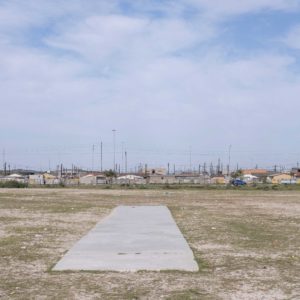Teaching life lessons through sport in Masiphumelele
A sports training programme is teaching young boys and girls to respect each other, whether it’s on the field or court, at home or in the violent streets of their impoverished township.
Author:
20 September 2021
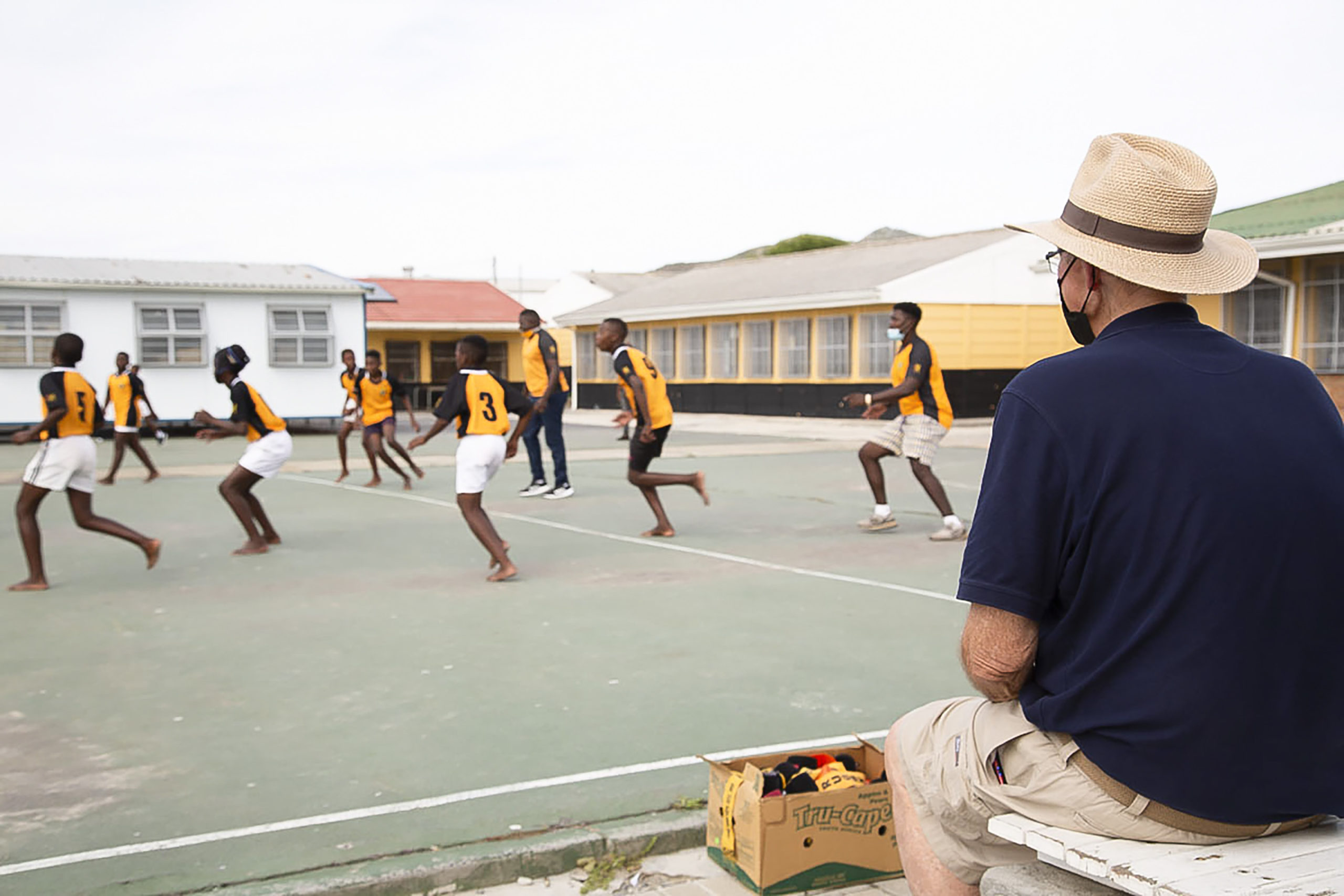
When he was mowing down opposition batting line-ups in his heyday as one of the world’s top fast bowlers in the 1970s and early 1980s, Vintcent van der Bijl often had to think outside the proverbial box to remove stubborn customers.
It’s that kind of approach that Big Vince, as the 2.02m-tall legend is affectionately known, has introduced at the Ukhanyo Primary School in Masiphumelele, Cape Town. His aim is to transform the school into a site of hope in a township where, like so many others, systemic social abandonment has generated a vortex of violent crime, drugs and gangsterism.
Initially known as Site 5, Masiphumelele’s first inhabitants moved to the barren land close to Cape Town’s well-heeled areas of Hout Bay, Noordhoek and Kommetjie in the 1980s. Now, the township is home to 45 000 people who are crammed into an area half a square kilometre in size.
Related article:
Unlike some of his peers who are armchair critics of transformation in sport, Van der Bijl is trying to make a difference where it’s needed most. A former teacher himself, he has helped Ukhanyo to develop its sport programme by deploying professional coaches and providing facilities.
“I was sitting on one of the benches in this extraordinary school that’s situated in this poor township,” says the former Natal and Transvaal paceman, now 73, who is regarded as a father figure at Ukhanyo. “A little kid, beautifully dressed in his school uniform, was running to school whistling and humming and I thought, wow, this is extraordinary.
“I worked out that what they needed was a proper sport programme. At the time they had one teacher, one coach, one sports track and one netball court, and that was it. Netball was the only sport they played against other schools and they had no branded kit. They had really nothing.”
Getting help from the big guns
As a member of the world cricket committee of the Marylebone Cricket Club, owners of Lord’s, the home of cricket situated in London, Van der Bijl used his influence to get much-needed funding for facilities at the school. The 224-year-old club, guardian of the rules of cricket, donated R900 000 in 2017 over a three-year period. As a result, in cooperation with the non-governmental organisation Masicorp, MasiSports was established to help the development of young people through sport.
Ukhanyo now boasts a multipurpose cement court, two netball courts, three cricket nets as well as two indoor soccer pitches. In addition, all the school’s teams now have branded kits and proper equipment. They also have 23 coaches at the primary school, eight at Masiphumelele High School and four who are seconded from Ukhanyo to the high school. There are now 19 teams taking part in different sports at the primary school and eight at the high school.
With the help of CoolPlay, a non-governmental organisation that integrates life skills into sports training sessions, the sport programme has grown into what Van der Bijl calls “the trilogy of education, life skills and sport”.
With sport now well established at Ukhanyo, Van der Bijl has switched his focus to devising a strategy to combat gender-based violence, which is a massive social problem in South Africa. Statistics show that 51% of the country’s women say they’ve experienced gender-based violence. This is higher than the international figure provided by the World Health Organization, which estimates that one in three women worldwide have experienced either physical or sexual violence, or both, in their lifetime.
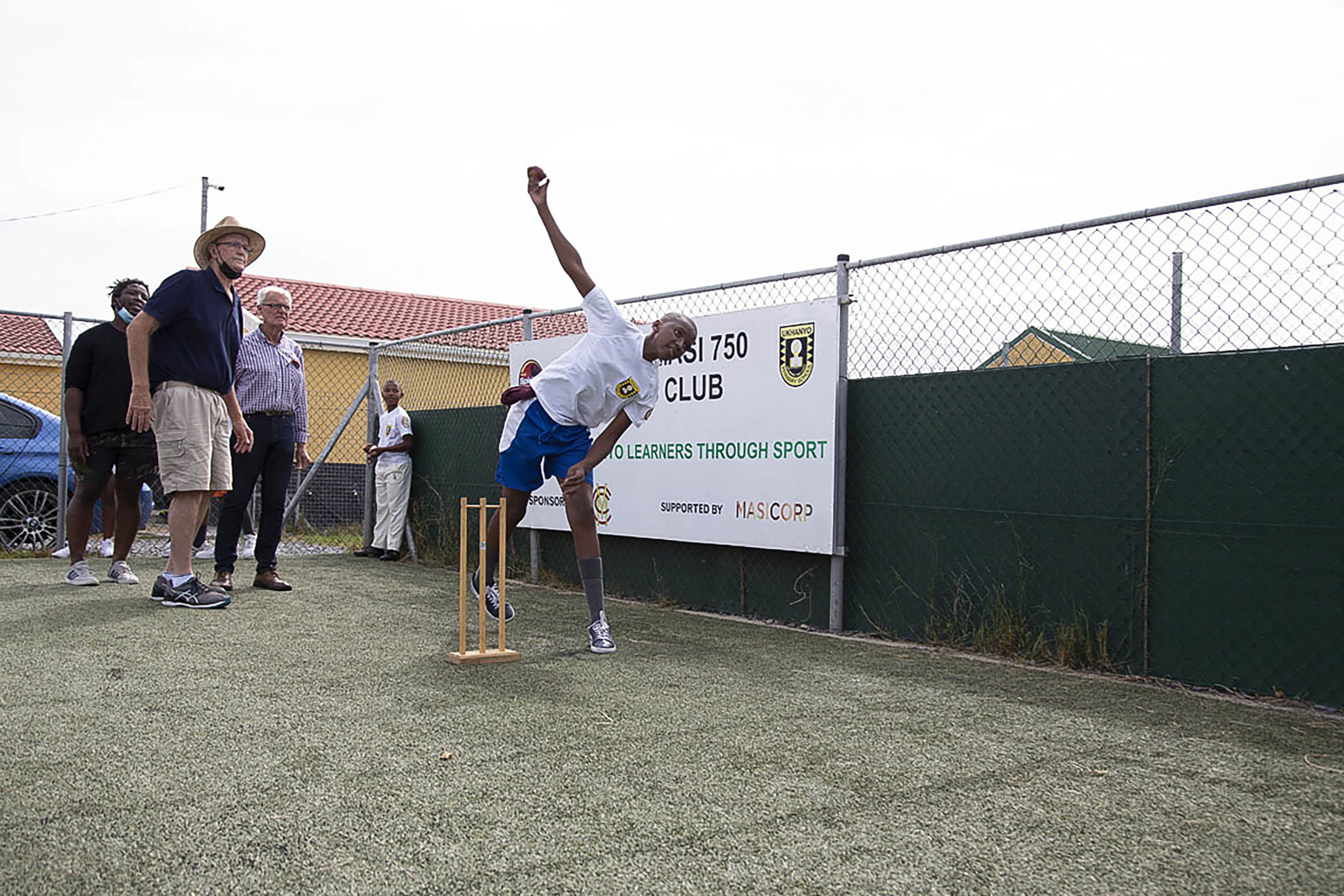
Van der Bijl says producing the next star of the Proteas, Bafana Bafana or Springboks is not the primary aim of the project – if it happens, it would be a bonus. “I’d prefer a role model to be someone who treats women with respect, who can easily navigate the world inside and outside the township. Those are the role models we need. Cape Town is one of the rape capitals of the world.
“Here in Masiphumelele, most of the women don’t feel safe. What we are doing with every single sport programme is that practice starts with a life skills session where they learn about social cohesion, mixing with people – especially outside the township – of different nationalities, races, religions and wealth groups so it helps them become better people when they leave school.
“Most important is that girls and boys learn to respect each other. All our teams, except for rugby, are mixed. We have street netball that includes two boys and six girls and the same applies to street soccer, which is the other way round. When boys play with girls, they can see the potential of girls, and girls can feel equal to boys because they’re playing in the same team.”
Instilling respect
Van der Bijl, who took 769 first-class wickets at a miserly average of 16.54 in a 16-year career, recalls how far they have come with engendering mutual respect among the children.
“When I first arrived here, we found that in the Under-10s the girls always beat the boys in short sprints over 50m. Previously, the boys who were beaten would push the girls to the tarmac and that really disturbed me. It prompted me to look at the gender equality issue.
“By instilling respect among boys and girls from a very young age we can turn the tide of gender-based violence that is so rampant in our communities,” says Van der Bijl. “We now have 26 staff members who volunteer for sports coaching, which is unheard of in a township.
“There are only 2 000 schools out of 25 000 in this country that have after-school sports. The potential in this country is ridiculous and we hope this will start to make people understand what is possible.”
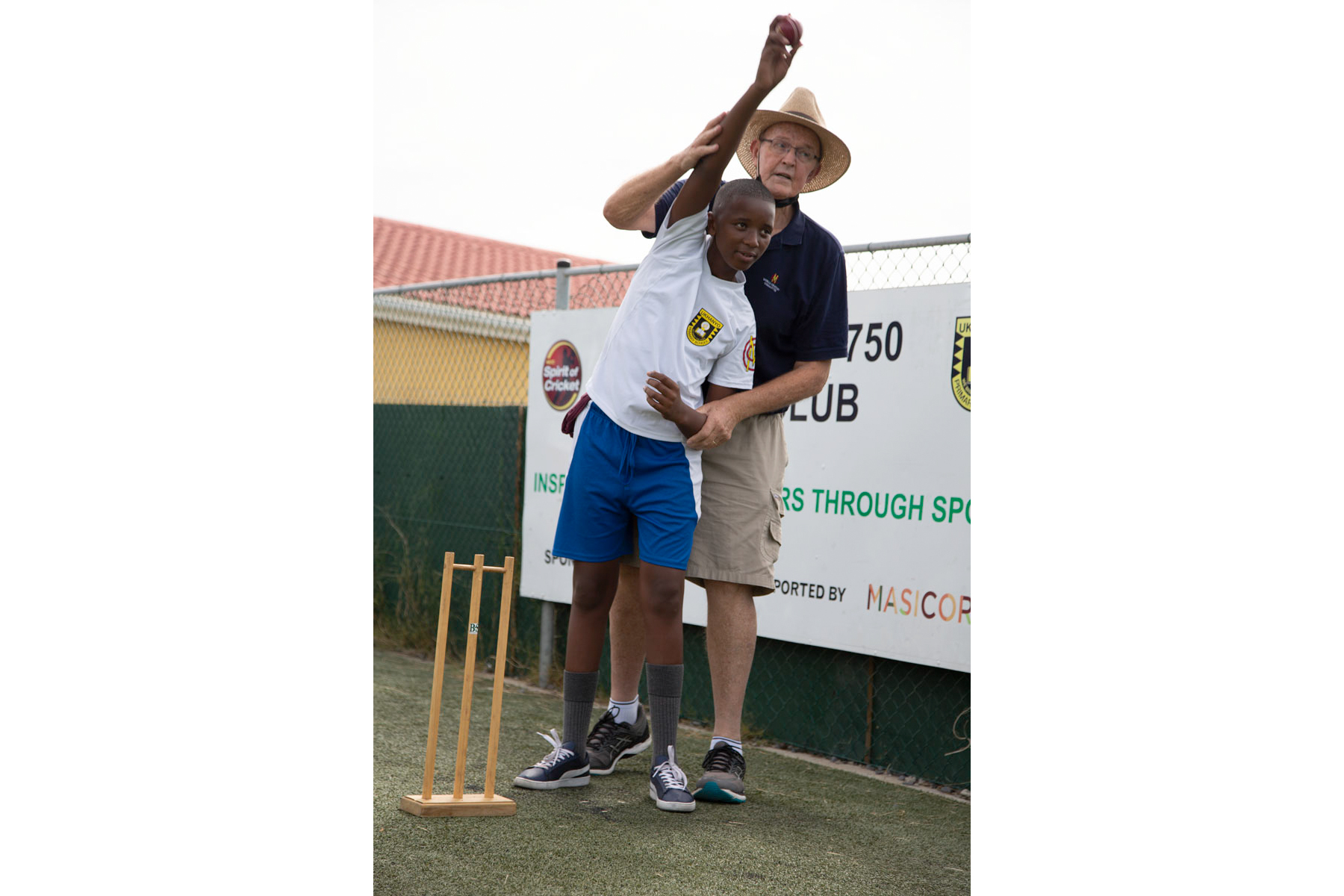
The school’s netball coach, Feziwe Payi, says young women like herself and the children she teaches on the court run the constant risk – whether at home, on the streets or out with friends – of becoming victims of gender-based violence.
“The situation is bad. Almost every day you are afraid to walk on the streets. You have to be home before dark. You hear screams of people going to work in the morning of someone being robbed.”
But she is hopeful that the life skills programme will bear fruit. “My hope is that if a young girl grows in confidence, she might feel she has the ability to say no when she’s put in a position she’s uncomfortable with.”
Payi says the idea of boys and girls sharing seemingly mundane tasks, like packing away equipment after training sessions, can make a huge difference in their home environment. “Now they know, even at home, chores aren’t just for girls. Washing dishes isn’t just for girls. We’re making progress.”
‘Girls can cycle too’
While it has become the norm for boys and girls to play together at Ukhanyo, Tyra Murasha, 13, has broken another barrier by taking up cycling. “My parents told me cycling is not for girls. They discouraged me from riding, but I was determined to prove them wrong. I believe all girls should be able to ride a bicycle.
“Even some boys said girls aren’t allowed to ride a bicycle, but they’ve changed their minds now. I’m encouraging my friends to ride too. My friend Anako first played netball but now she loves cycling after our coach, Lubabalo Begala, taught her.”
Begala, a member of the Songezo Jim Cycling Academy, started cycling competitively only in 2016 after buying a mountain bike from a friend the previous year. In his first race, the 94.7 Cycle Challenge in Johannesburg (now the 947 Ride Joburg), he finished 14th.
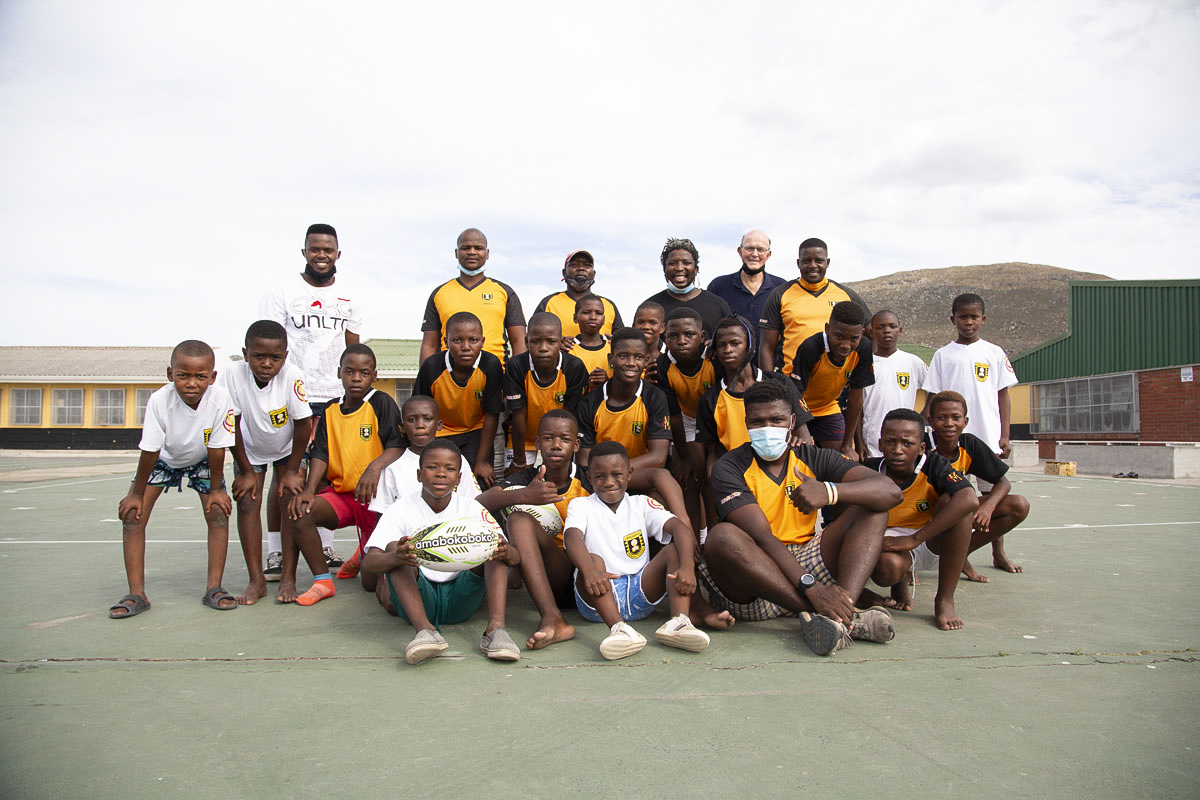
“We’re showing the girls that they can cycle too – cycling is for everyone. It’s good for them to break those stereotypes. Two kids who never cycled before are now winning provincial races in their age group. I’m proud of that.”
Springbok hooker Scarra Ntubeni, an ambassador for the programme, says he’s been amazed at what has already been achieved at Ukhanyo. “The boys treat the girls with a lot of respect and that’s what’s needed. Hopefully they can spread that to their friends when they walk out of these gates.
“Gender-based violence is a massive problem in this country. The onus is also on us as men and parents to lead by example and to teach the younger ones about it. When I was growing up you would hear about it, but nothing would happen. We need to call it out and support the women. I’m sure you wouldn’t want that to happen to your sister or mother or your daughter.”

